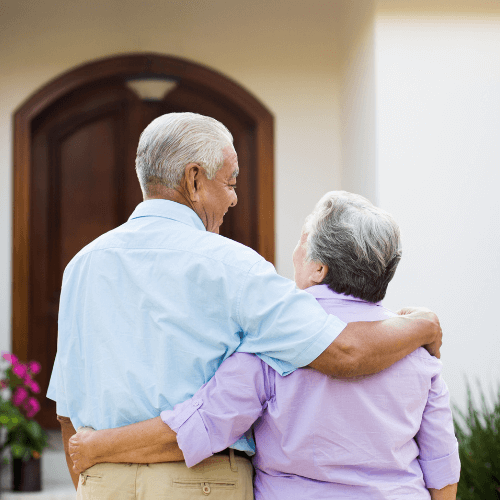According to a 2022 survey conducted by the United States Census Bureau, 3 in 10 adults over the age of 65 live alone. Some people welcome this independence, but there’s no denying that living alone opens the door to potential risks like falls, medical emergencies, home security threats, and hazards like fire and smoke.
Let’s also not forget that social isolation is known to increase mental health and cognitive challenges. Despite these truths, there are ways to make sure that maintaining independence never jeopardizes safety.

By following senior safety tips, older adults can live alone with peace of mind without worrying about an emergency happening at home.
One of the leading causes of injury among seniors is falling. In fact, the risk increases for older people. For example, seniors over 85 fall at a rate 9 times higher than those between 64 and 72. When living alone, hazards that wouldn’t usually be considered as such can easily be overlooked.
Some examples are poor lighting, unsafe stairs, slippery floors, and loose rugs. Furthermore, there are specific areas of a house where you’re more likely to fall, so it’s critical to be proactive in danger-proofing your home.
Improve bathroom safety: Install grab bars, shower stairs, non-slip flooring, and bathmats.
Enhance lighting: Set up motion-activated lighting in critical areas of the house, such as bathrooms, hallways, entryways, and staircases.
Clear trip hazards: Remove clutter and loose rugs from hallways and tuck away cables and cords.
Medical alert systems are one of the best ways to reduce the risk of life-altering consequences after falling. These solutions usually offer systems for at-home and outdoor-loving seniors, including portable and personal safety devices for convenience.
They typically come in the form of pendants and wristbands with GPS technology and buttons to call for help. By wearing them, seniors can quickly push the button and talk with a trained emergency dispatcher who’ll evaluate the situation and request emergency services if needed.
For added safety, medical alert systems started offering fall detection technology in smartwatches, pendants, and wristbands. This technology usually eliminates the need to speak with an operator, automatically dispatching emergency services when a fall is detected. One of the best medical alert systems for seniors is Lifeline, which offers multiple medical alert products, including a sleek smartwatch with fall detection, GPS, and even a mobile app.
Lifeline (former Phillips Lifeline) is a medical alert system company with over 50 years of experience in the industry. It offers multiple solutions to help seniors maintain independence, even if they have medical concerns. The company works with specialized care agents who are available 24/7 and offer at-home and mobile solutions.
Among its features are fall detection, a mobile app, step tracking, and heart monitoring. Choosing yearly or semiannual plans rewards customers with free shipping and a lockbox. For improved accessibility, the company can be reached via its toll-free number +1 (888) 825-6710.
Another way to avoid potential health concerns when living alone is to have a well-prepared emergency plan. Having a response plan can significantly increase emergency preparedness for seniors, reducing the long-term effects of such situations. This plan should include:

Older adults living alone are more likely to be victims of burglary, fraud, and scams than any other demographic. This stems primarily from criminals perceiving older people to be vulnerable, isolated, and naive.
To steer clear of such scenarios, it’s fundamental to adopt specific home safety measures, such as using peepholes, ensuring doors and windows are locked, and installing motion-sensor lighting.
Fortunately, home security systems have come a long way in recent years. They now offer a range of affordable options for every budget. They are highly effective in deterring criminals and include security equipment like surveillance cameras, alarm systems, smart sensors, and smart locks.
Alternatively, medical alert systems like Lifeline can also be helpful in situations like break-ins. The personal safety devices for the elderly are equipped with an SOS button that allows users to connect with a trained emergency operator quickly. The operator can then dispatch the appropriate help, whether it’s medical responders, the police, or the fire department.
While many seniors live alone, this doesn’t mean they’re stuck at home 24/7. If you’re not housebound, we highly recommend engaging in an active lifestyle. It’s crucial to tackle social isolation and the associated physical and mental health concerns that can arise from living alone.
While being active is essential to reduce stress and anxiety, venturing outdoors presents dangers that should be addressed. We recommend taking extra precautions by following senior safety tips for a positive outdoor experience:

Living alone comes with its challenges at any age, but the potential risks increase as you get older. Adversities like fire hazards, falls, exposure to criminals, and hikes through unfamiliar areas are just a few examples in a long list.
Key safety tips, such as constructing an emergency plan, installing motion-sensor lighting, improving stair safety, ensuring accessibility, and carrying a phone whenever going outside, are essential to guaranteeing senior safety.
In addition, subscribing to a medical alert system like Lifeline adds an extra layer of security that few other recommendations can deliver. It offers advanced technology like automatic fall detection, SOS buttons as wristbands and necklaces, GPS, and 24/7 fast-response emergency service delivery. If you want to know more, don’t hesitate to read our extensive review of Lifeline.
Share your thoughts, ask questions, and connect with other users. Your feedback helps our community make better decisions.
©2012-2025 Best Reviews, a clovio brand –
All rights
reserved